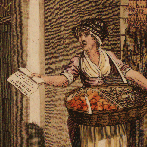 Next week (6 December) will see the launch of the beta version of Electronic Ephemera: Digitised Selections from the John Johnson Collection at Online Information 2007, London.
Next week (6 December) will see the launch of the beta version of Electronic Ephemera: Digitised Selections from the John Johnson Collection at Online Information 2007, London.
This new e-resource is part of the JISC Phase Two Digitisation Programme and features selections from the Bodleian Library’s John Johnson Collection, one of the most important collections of printed ephemera in the world spanning the entire range of printing and social history between 1508-1939.
Delivered through an innovative public-private collaboration between the Bodleian Library and ProQuest CSA, the project is an example of a variety of business models that feature in the JISC Digitisation Programme. The event will also provide some background on the working of successful partnerships and the benefits to the wider academic community that such collaborations can bring.
Libraries and other cultural institutions keen to engage with the commercial sector for mass digitisation of their collections will find it useful to read a recent report, Good Terms – Improving Commercial-Noncommercial Partnerships for Mass Digitization.
The study proposes key objectives that public bodies should strive towards when negotiating their terms of partnership with commercial organisations.
